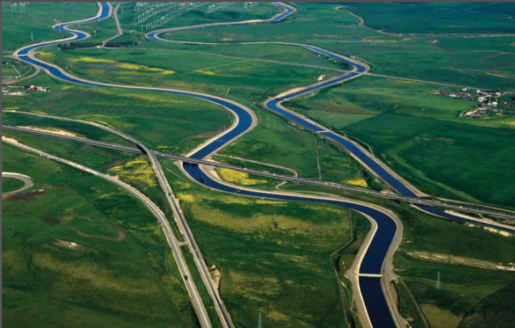Brown’s water tunnels plan still alive, but obstacles are many
 With a seeming vote of confidence from the Metropolitan Water District of Southern California – the giant agency that supplies water to about half the state’s 38 million residents – Gov. Jerry Brown appears set to soldier ahead with his $17 billion plan to build two 35-mile-long tunnels under the Sacramento-San Joaquin Delta.
With a seeming vote of confidence from the Metropolitan Water District of Southern California – the giant agency that supplies water to about half the state’s 38 million residents – Gov. Jerry Brown appears set to soldier ahead with his $17 billion plan to build two 35-mile-long tunnels under the Sacramento-San Joaquin Delta.
Brown’s view that the tunnels are crucial both to stabilize the Delta ecosystem and to shore up the state’s water distribution system was rejected last week by the board of the Westlands Water District, which voted 7-1 against joining in the “California WaterFix” project. Westlands – the nation’s largest agricultural water district with 600,000 acres of farmland in Fresno and Kings counties – had been counted on to cover about $3 billion of the project’s total cost.
But Westlands officials voted “no” after expressing concern both about the high price-tag they’d have to pay and about whether WaterFix truly would make water supplies more consistent and reliable. The water district was the first in the state to decide on whether to sign up for the project, and its decisive early opposition appeared to stun some supporters.
This led to reports that Brown’s legacy project could be all but dead by Oct. 10, when the MWD is scheduled to vote on whether to participate. The agency is expected to cover $4 billion of the project’s cost.
But on Tuesday, MWD leaders indicated that at least for now, they were still supportive. Board member Larry McKenney said it was in MWD’s interest to try to promote confidence in the project going forward, according to a Sacramento Bee report. MWD shares Brown’s view that the project is crucial for long-term water distribution reliability.
Brown’s would-be successors cool to his plan
Yet the MWD reprieve might not save the day for WaterFix. For months, Sacramento insiders have noted that Brown appears far more enthusiastic about the project than other significant players in state politics – including those running to succeed him as governor next year.
Los Angeles Times columnist George Skelton reported Tuesday that Lt. Gov. Gavin Newsom, state Treasurer John Chiang and former Los Angeles Mayor Antonio Villaraigosa had each expressed doubts about the project. Newsom and Chiang worried about its environmental impact on the Delta and beyond, while Villaraigosa suggested bold new conservation programs should be tried to see if they could save enough water to make the tunnels unnecessary.
But even if the Westlands district, Newsom, Chiang and Villaraigosa were all on the WaterFix bandwagon, its future would hardly be assured. Environmentalists have a long history of suing and winning over California water policies. In June, they filed the first two of what could be several federal lawsuits targeting Brown’s project in response to a preliminary go-ahead given by the Trump administration.
The Natural Resources Defense Council, the Defenders of Wildlife, the Bay Institute and the Golden Gate Salmon Association alleged that the project would wipe out salmon, smelt and other fish and would worsen water quality not just in the Delta but the San Francisco Bay.
While the Trump administration gave initial approval to WaterFix, it too could prove a wildcard. House Republican Majority Leader Kevin McCarthy of Bakersfield and other GOP lawmakers from California have urged the White House to challenge water allocation policies they have long argued favor Delta fish over human beings.
While it didn’t register as significant news in California, Trump’s nomination of David Bernhardt to the No. 2 job in the Interior Department this spring suggested changes in how the federal government deals with water in the Golden State could be in the offing.
As CalWatchdog reported in June, Bernhardt is a Colorado-based partner in Brownstein Hyatt Farber Schreck, a law firm which has represented the Westlands Water District in federal lawsuits targeting Interior Department policies. This background and other concerns led 43 Senate Democrats to vote against his confirmation in July.
Chris Reed
Chris Reed is a regular contributor to Cal Watchdog. Reed is an editorial writer for U-T San Diego. Before joining the U-T in July 2005, he was the opinion-page columns editor and wrote the featured weekly Unspin column for The Orange County Register. Reed was on the national board of the Association of Opinion Page Editors from 2003-2005. From 2000 to 2005, Reed made more than 100 appearances as a featured news analyst on Los Angeles-area National Public Radio affiliate KPCC-FM. From 1990 to 1998, Reed was an editor, metro columnist and film critic at the Inland Valley Daily Bulletin in Ontario. Reed has a political science degree from the University of Hawaii (Hilo campus), where he edited the student newspaper, the Vulcan News, his senior year. He is on Twitter: @chrisreed99.
Related Articles
Future state retiree health benefits to top $51.8 billion
State Controller John Chiang released a report yesterday that calculates the dollar-amount value of the health and dental benefits now
CalWatchdog Morning Read – November 7
Prop. 66 caps death penalty appeals at five years. What happens then? 10 things to know about the measure to
Good News: Guv OK On Furloughs
Steven Greenhut: The state Supreme Court upheld Gov. Arnold Schwarzenegger’s furlough program, which saved the state about $3 billion by



